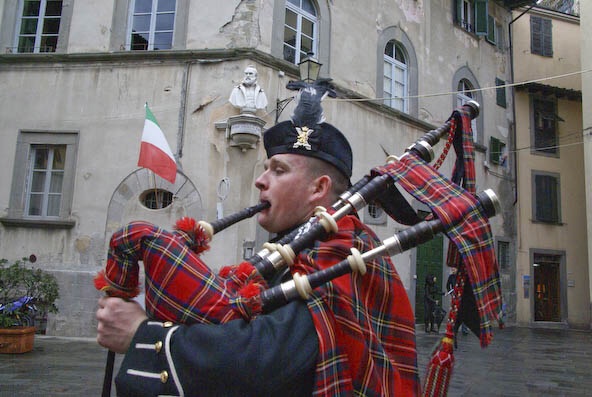The Barga-Scotland connection continues with the traditional Rabbie Burns Supper at Riccardo’s restaurant on Thursday 22.01.where typical Scottish dishes such as smoked salmon, cock-a-leekie soup (chicken and leek soup); haggis, neeps and tatties and apple pie and custard will be served accompanied by the sound of the bagpipes.
For those who are not familiar with this tradition here is some background to the event:
Burns Night is annually celebrated in Scotland on or around January 25. It commemorates the life of the bard (poet) Robert Burns, who was born on January 25, 1759. The day also celebrates Burns’ contribution to Scottish culture. Burns’ best known work is “Auld Lang Syne”.
Robert Burns (or better know as Rabbie Burns) was born in Alloway, Scotland, on January 25, 1759. He died in Dumfries, Scotland, on July 21, 1796. He was a bard (poet) and wrote many poems, lyrics and other pieces that addressed political and civil issues. Perhaps his best known work is “Auld Lang Syne”, which is sung at New Year’s Eve celebrations in Scotland, parts of the United Kingdom, and other places around the world. Burns is one of Scotland’s important cultural icons and is well known among Scottish expats or descendants around the world.
The first Burns’ supper was held on July 21 on the anniversary of his death, in Ayrshire, Scotland, in the late 1700s. The date was later changed to January 25, which marks his birthday.
At Burns’ Night events, many men wear kilts and women may wear shawls, skirts or dresses made from their family tartan.
Many types of food are associated with Burns’ Night. These include: cock-a-leekie soup (chicken and leek soup); haggis; neeps (mashed turnips or swedes) and tatties (mashed potatoes). Whisky is the traditional drink.
The evening centers on the entrance of the haggis (a type of sausage prepared in a sheep’s stomach) on a large platter to the sound of a piper playing bagpipes. When the haggis is on the table, the host reads the “Address to a Haggis”. This is an ode that Robert Burns wrote to the Scottish dish. At the end of the reading, the haggis is ceremonially sliced into two pieces and the meal begins.
Address to a Haggis
Fair fa’ your honest, sonsie face,
Great chieftain o the puddin’-race!
Aboon them a’ ye tak your place,
Painch, tripe, or thairm:
Weel are ye worthy o’ a grace
As lang’s my arm.The groaning trencher there ye fill,
Your hurdies like a distant hill,
Your pin wad help to mend a mill
In time o need,
While thro your pores the dews distil
Like amber bead.His knife see rustic Labour dight,
An cut you up wi ready slight,
Trenching your gushing entrails bright,
Like onie ditch;
And then, O what a glorious sight,
Warm-reekin, rich!Then, horn for horn, they stretch an strive:
Deil tak the hindmost, on they drive,
Till a’ their weel-swall’d kytes belyve
Are bent like drums;
The auld Guidman, maist like to rive,
‘Bethankit’ hums.Is there that owre his French ragout,
Or olio that wad staw a sow,
Or fricassee wad mak her spew
Wi perfect scunner,
Looks down wi sneering, scornfu view
On sic a dinner?Poor devil! see him owre his trash,
As feckless as a wither’d rash,
His spindle shank a guid whip-lash,
His nieve a nit;
Thro bloody flood or field to dash,
O how unfit!But mark the Rustic, haggis-fed,
The trembling earth resounds his tread,
Clap in his walie nieve a blade,
He’ll make it whissle;
An legs an arms, an heads will sned,
Like taps o thrissle.Ye Pow’rs, wha mak mankind your care,
And dish them out their bill o fare,
Auld Scotland wants nae skinking ware
That jaups in luggies:
But, if ye wish her gratefu prayer,
Gie her a Haggis


Lascia un commento